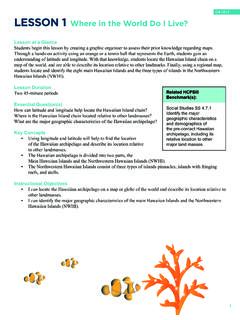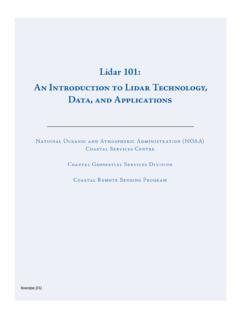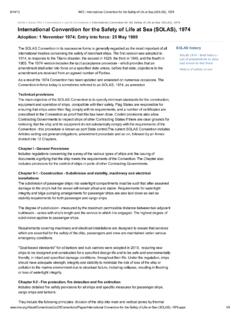Transcription of American Indian Religious Freedom Act Agencies: Citation ...
1 American Indian Religious Freedom Act Agencies: Federal departments, agencies, and other instrumentalities responsible for administering relevant laws, National Park Service, Department of the Interior. Citation : 42 1996 Enacted as: The American Indian Religious Freedom Act, on August 11, 1978 Where Law Applies: Summary of the Law: The American Indian Religious Freedom Act of 1978 (AIRFA) (42 1996.) protects the rights of Native Americans to exercise their traditional religions by ensuring access to sites, use and possession of sacred objects, and the Freedom to worship through ceremonials and traditional rites. AIRFA is primarily a policy statement. Approximately half of the brief statute is devoted to Congressional findings. Following the Congressional findings, the Act makes a general policy statement regarding American Indian Religious Freedom : On and after August 11, 1978, it shall be the policy of the United States to protect and preserve for American Indians their inherent right of Freedom to believe, express, and exercise the traditional religions of the American Indian , Eskimo, Aleut, and Native Hawaiians, including but not limited to access to sites, use and possession of sacred objects, and the Freedom to worship through ceremonials and traditional rites.
2 42 1996 (2011). The intent of AIRFA has been interpreted as ensuring that Native Americans obtain First Amendment protection, but not to grant Native Americans rights in excess of the First Amendment. Because such sites may be eligible for inclusion in the National Register, any effects that may occur, as a result of providing access to them, may trigger Section 106 review under the National Historic Preservation Act (NHPA). As a related law, the NHPA greatly strengthens the requirements for Federal agencies to ensure that tribal values are taken into account. Tribes are given greater control over patrimonial objects and are allowed to establish their own culturally-specific criteria of significance. NPS Heritage Preservation Services has a major role in fulfilling AIRFA federal policy through its programs that provide: financial and technical assistance to tribes, leadership in the preservation of the prehistoric and historic resources of the United States, leadership in the administration of the national preservation program in partnership with states, Indian tribes, Native Hawaiians, and local governments, Assistance to state and local governments, Indian tribes and Native Hawaiian organizations, and the National Trust for Historic Preservation in the United States to expand and accelerate their historic preservation programs and activities.
3 Although almost thirty years have passed since the passage of AIRFA, public resistance to the law continues in the present, signaling a continuing the need for public education. Source: ; ; Cases: Lyng v. Northwest Indian Cemetery Protective Association, 485 439 (1998) (holding that AIRFA does not create a cause of action under which to sue, nor does it contain any judicially enforceable rights). Other Relevant Sources: Jimmy Carter, American Indian Religious Freedom Statement on Signing REs. 102 Into Law, August 12, 1978.










